
Create a Social Audio App Like Clubhouse/Twitter Spaces
- Riya Thambiraj
![Riya Thambiraj]()
- Web Development
- Last updated on
Key Takeaways
Audio apps have transformed communication, especially during the COVID-19 pandemic, with platforms like Clubhouse gaining popularity.
Social audio apps allow users to share and stream audio content, connect with others, and create audio-based communities.
Popular social audio apps include Clubhouse, Twitter Spaces, Facebook Live Audio Rooms, and Cappuccino, each with unique features.
Building a social audio app can boost engagement, offer nuanced communication, and tap into a high-demand market with growth potential.
Essential steps to build a voice app include discovery, gathering requirements, UI design, feasibility validation, and iterative upgrades.
A typical technology stack for audio chat apps includes React Native, Node.JS, MySQL, AWS, and WebRTC.
Monetization strategies for audio chat apps include subscriptions, in-app purchases, advertising, and brand partnerships.
RaftLabs offers expertise in creating scalable audio streaming solutions with platforms like Agora and AWS Media Services.
Now is an opportune time to launch a social audio app and capitalize on the relatively untapped market.
Have you ever used an audio app to connect with others?
Audio apps have revolutionized communication by allowing people to connect easily for business, socializing, or gaming purposes, regardless of location.
During the COVID-19 pandemic, the popularity of social audio platforms such as Clubhouse significantly grew. People turned to these platforms to connect with others while physical distancing measures were in place.
Thus the world started recognizing the need for and demand for social audio platforms to maintain social connections and facilitate communication.
Clubhouse received 600,000 monthly app downloads in April 2022. It shows that people started realizing the need for and demand for social audio platforms to maintain social connections and facilitate communication.
1. What are social audio apps?
Social audio apps are digital platforms available on the web, iOS, and Android phones. These apps enable users to share audio content, such as music, podcasts, or live broadcasts, with other users.
Some famous examples of social audio apps are Clubhouse, Twitter Spaces, Facebook Live Audio Rooms, and Cappuccino.
Main features of social audio apps:
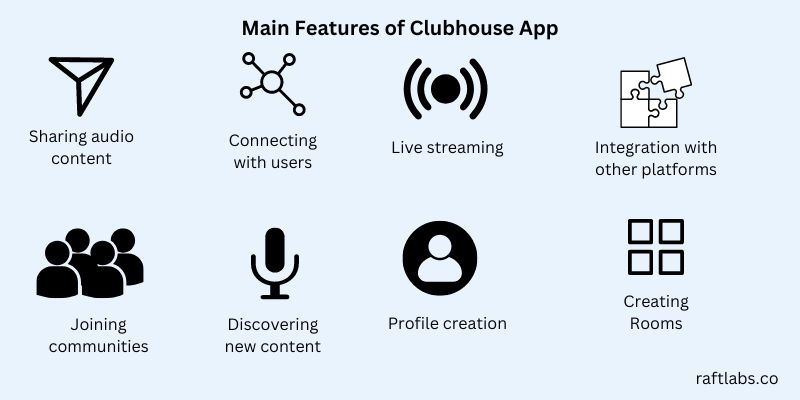
Sharing and streaming audio content, such as music, podcasts, and live broadcasts.
Connecting with other users based on shared interests.
Live streaming and commenting on audio content.
Creating and joining audio-based communities.
Discovering new audio content through personalized recommendations.
Profile creation and networking with other users.
Creating and hosting audio rooms for live conversations and discussions.
Integration with other social media platforms for easy sharing and promotion.
2. Famous social audio apps
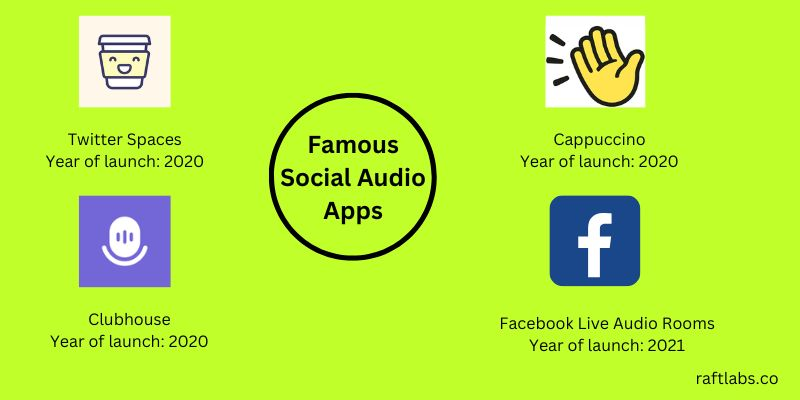
Twitter Spaces (X Spaces)
Twitter Spaces (X Spaces) is a live audio conversation feature that allows users to host and join live audio conversations on Twitter.
Year of launch: 2020
Features
Hosting a Space: Any user with a verified account can host a Space, which allows them to invite other users to join and participate in the conversation.
Listening: Users can join a Space as a listener and participate in the conversation by sending emojis and sending messages to the host.
Live Captioning: Spaces include live captioning for those who are deaf or hard of hearing.
Control: Hosts can control who speaks, mute, or remove participants from the Space.
Availability: Twitter Spaces is available on iOS and Android via the Twitter app and web.
Facebook Live Audio Rooms
Facebook Live Audio Rooms allows multiple hosts to join the same live audio session and talk together.
It enables users to join and listen to live conversations.
It also has breakout rooms and supports live captions and screen sharing.
Year of launch: 2021
Features
Multi-host: Multiple hosts can join and participate in the same live audio session.
Live interaction: Listeners can interact with the host and other listeners by commenting or reacting in real time.
Video support: Users can join the live audio session with video, allowing for a more immersive experience.
Breakout rooms: Hosts can create smaller group conversations by splitting the audience into breakout rooms.
Live captions: Live captions are available for users who are deaf or hard of hearing.
Screensharing: Hosts can share their screens to present visual aids or other materials during the live audio session.
Availability: The feature is available on Facebook through the mobile app and the web.
Cappuccino
Cappuccino is an audio app that enables users to create groups, record short audio messages, and share them with other group members.
These messages are called "beans" and are delivered the next day.
Year of launch: 2020
Features
Daily Audio Show: Connecting with people through a daily personal audio show featuring friends.
Podcasts: Creating groups and listening to daily podcasts featuring the voices of friends.
Audio Only: Audio format eliminates the need to be "video ready" or to type anything out.
Availability: Available for iOS for creating and joining groups and Android for joining groups.
Simple Recording: Simple to use, record a "bean" (a short audio message), talk about your day, tell a joke or share a thought, and send it to close friends and family.
Group Audio: Listen to the group's audio "Cappuccino" every morning at 8 am.
Clubhouse
Clubhouse is a social media app that allows users to join and participate in audio-based chat rooms and discussions.
It's an invite-only app.
Year of launch: 2020
Features
Rooms: The app offers various types of rooms for audio-based conversations; users can browse and join existing rooms or create their own using the "Start a Room" button.
Clubs: The users can join interest-based clubs for like-minded individuals and suggest discussion topics within the club.
Newsfeed: The app feed is the central hub for discovering new rooms. Users can browse, search, join, stay updated on recent conversations, and stay connected with friends and other users.
Search Functionality: Users can use the search functionality for chat topics to join or follow exciting personas.
Activity Tab: The activity tab in Clubhouse displays the history of interactions with your account, like who followed you, scheduled events and the clubs entered.
Notifications: The notification feature informs users of important events and updates within the app and helps them stay updated.
3. Why should you build a social audio app?
Boosts engagement: Social audio apps drive engagement with the audience as they add an audio element to communication and reach those who prefer audio over text.
Nuanced communication: Audio conversations have no word limit; it allows for in-depth explanations, side notes, real-time Q&A, and rich conversations, compared to traditional social media with a word limit.
High demand: The popularity of the Clubhouse app shows a clear need for social audio apps. Creating a similar app can tap into this existing market.
Novel concept: Social audio apps offer a new and unique way for users to connect and communicate, making it an appealing idea for many people.
Earn credibility: Audio content allows for showcasing expertise, building credibility and earning customer trust, attracting new customers, and improving customer loyalty.
Growth potential: As the market for social audio apps is still relatively new, there is significant potential for growth and expansion for an app in this space.
Monetization opportunities: There are various ways to monetize a social audio app, such as through in-app purchases, subscriptions, or advertising.
Low competition: The market for social audio apps is relatively untapped, and only a few competitors exist.
Can target specific niches: The concept of audio-based conversation enables building a niche-focused app, which may not be possible with video conferencing or text-based apps.
Consumer insights: The analytics of apps offer valuable insights into customer demographics, interests, and aspirations. For broader market and competitor research, teams may also use social listening or anonymous viewing tools to observe public trends and user behavior without influencing results. This helps businesses to improve customer service and product innovation.
Consumer experience: 27.9% of social media users use it to find inspiration, and 23% to see brand posts. Hence, it's an excellent opportunity for companies to increase brand awareness, referrals, and loyal customers through strategic social media content creation that resonates with their audio-based audience.
4. Build a voice app in 5 steps
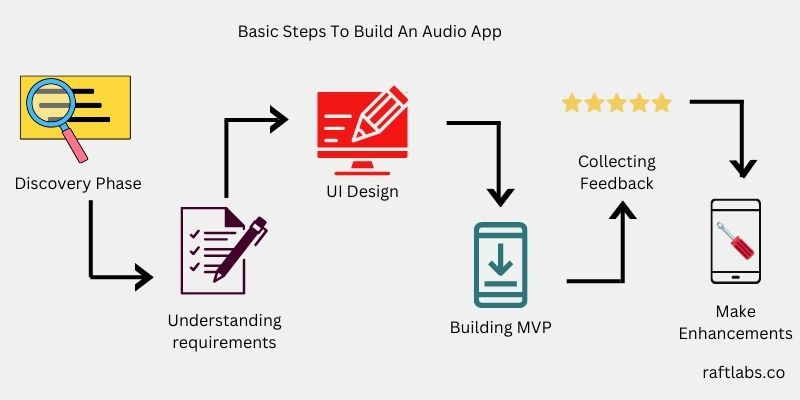
- Discovery phase: This phase helps to reveal weaknesses, and unsatisfied user demands, increasing the chances of launching a better product.
- Gathering requirements: Understand the features and functionality necessary for the app, such as the ability to create and join rooms, the ability to speak and listen in real-time, and the ability to mute or unmute audio.
- Designing the UI: Create wireframes or mockups that show how users will interact with the app, including what buttons or actions will be available and how the app will look and feel.
- Validate the feasibility: Build an MVP for your voice app that includes a simple UI for creating/joining rooms, real-time audio communication, and backend support.
- Collect feedback and upgrade: App development involves iteratively releasing versions, gathering user feedback, fixing bugs and errors, and improving the app based on feedback.
5. Technology stack for your audio chat application
Front-End - React Native, Flutter
Backend - Python, Node.JS
Database - MySQL, MongoDB, PostgreSQL
Cloud hosting- Amazon Web Services (AWS)
Audio processing - Audio API, OpenAL
Real-time audio streaming and communication - WebRTC, CPaaS like Agora.io, Twilio.
6. Must have MVP features in your social audio application?
- Account Creation & Login Feature: Users must be able to create and log in to their personalized accounts, where they can save their audio and preferences.
- Recording & Uploading Audio: This feature allows users to record and upload audio for other members to hear, share and interact.
- Playback Functionality: Users must be able to save their audio and replay it later.
- Search & Discovery: Users must be able to discover new audio content by searching and browsing through categories, hashtags, or audio content of other users.
- Social Interaction: Users must be able to interact with the audio content by commenting, sharing, or liking the content. It makes the app more engaging.
- Push Notifications: This feature helps people remain updated with the latest happenings in the app.
- Profile Customization: The users must be able to personalize their profile by choosing a profile picture, writing a bio, and other profile settings.
- Follow Users: Users must be able to follow another user to stay updated with their favorite creators.
- Privacy Settings: Users must be able to control who can access and interact with their audio content, allowing them to choose who can see and listen to their audio recordings.
7. How much does it cost to develop a voice app?
The cost of building an audio call app can vary depending on the below apps.
The cost of building an audio app can vary widely depending on factors like product complexity, features, size, design, and time frame.
The number of members in the development team can also affect the price.
Your app development team must include the following members:
- A project manager oversees the development, implementation, and deployment of audio features in an app while ensuring stakeholder satisfaction.
- A UI/UX designer creates the visual design and best user experience for the audio feature, guaranteeing ease of use and aesthetic appeal for the app's users.
- A front-end developer creates and implements the user interface for your audio chat application, ensuring the audio feature is visually displayable and interactive in the mobile app.
- A back-end developer for the audio app creates and manages the server-side functions that allow the audio feature to function and interact with the data in the mobile app.
A basic audio app costs around US $15K to $25K. An app with higher complexity and advanced features can incur a price of more than US $50K.
Consult a software development company for a precise cost estimate according to your specific needs.
8. How to monetize your audio chat app?
Subscriptions: Offer a subscription-based model where users can access premium features or exclusive content for a monthly or yearly fee.
In-app purchases: Offer in-app purchases such as additional storage options, custom profile designs, unlocking ad-free experience, etc.
Advertising: Include advertising in the app, such as banner ads or sponsored content for businesses looking to reach your app's audience.
Sponsored rooms: Allow brands or individuals to sponsor rooms, allowing them to host or sponsor events and have their branding featured in the rooms.
Integration with other platforms: Integrate with other platforms such as e-commerce, ride-hailing, or food delivery to generate additional revenue streams.
Paid access to events: Allow users to pay for specific events or seminars hosted on the app.
Brand partnerships: Partner with brands or companies to provide exclusive deals or offers to app users.
9. Why choose RaftLabs?
RaftLabs helps you create solutions for real-time audio conversations and high-fidelity audio content distribution, such as music playlists, podcasts, and stories, customizable to fit your needs.
With over a decade of experience in online video and audio streaming, our team specializes in utilizing highly scalable and dependable platforms and technologies such as Agora and AWS Media Services. We're happy to offer free project estimates and operate under non-disclosure agreements (NDAs).
Build an audio streaming app for your business with more loveable features.
10. Our Works
Voice chat web app for scalable decision-making
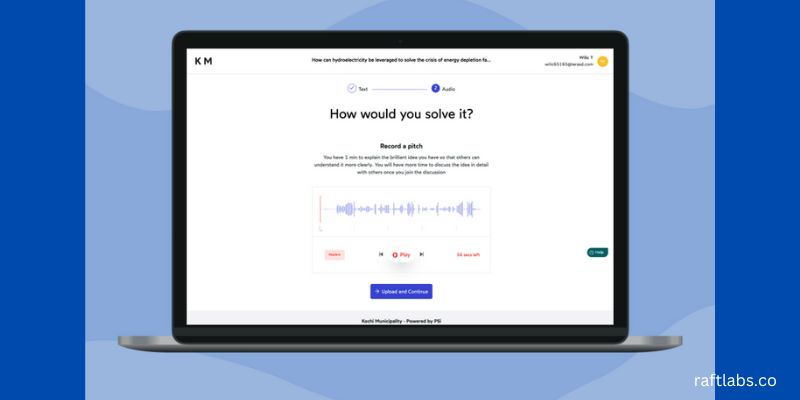
Our team created a highly scalable and engaging SaaS platform utilizing voice technology, allowing for efficient decision-making for civic organizations, corporations, and institutions in 14 weeks.
An OTT video streaming platform
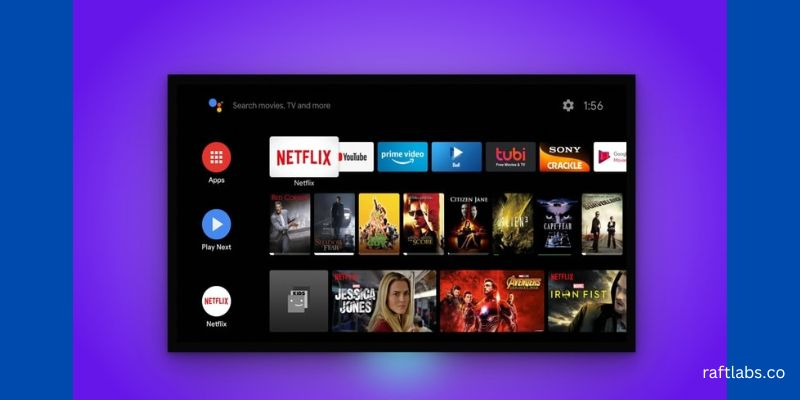
In 18 weeks, our team successfully implemented a solution for a weekly movie release distribution platform, servicing 4000 small-screen theater subscribers with advanced analytics and billing features.
The bottom line
Take advantage of the opportunity to launch your social audio app idea and capitalize on a relatively untapped market. Now is the right time to create your version of an audio app like Clubhouse or Twitter Spaces before it becomes saturated with competitors such as Facebook, Twitter, and other tech giants.
With a social audio app, you can access live conversations and form your network to connect with potential clients. Have a free technical discussion with the technical experts at RaftLabs. Let's create your audio chat app or enhance your existing platform with advanced voice chat features.



